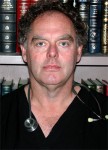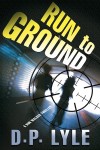Run To Ground by D. P. Lyle
You are a practicing cardiologist, best-selling author, consultant to major media and other authors, and online professor. The first and most obvious question: how the heck do you manage to do all that?
Cats. Get cats and you won’t sleep much so you might as well work. Also, I wouldn’t know what to do with myself if I didn’t work 80 hours a week. Medical school, residency, medical practice, all require at least that degree of time commitment so now that I only practice part time I still fill the same number of hours with writing and these other endeavors. I’m not big on down time. And for the most part sleep is a waste of time.
At what point in that remarkable career did you decide to become a thriller writer? (And why?)
I grew up in South where storytelling is a tradition and I could always spin a yarn. I had stories I wanted to write but didn’t know if I could and didn’t really have the time. I always said that when I retired I would write. But I realized that retirement wasn’t going to happen since I love my job so about 17 or 18 years ago I said, “If not now, when?” I took a couple of night classes at the University of California, Irvine and joined a couple of writing groups and began writing. With my love for medical and forensic science, thrillers were the natural path to follow.
Give us the elevator pitch for your new novel, please. Or, if you prefer, the longer, walk-up-five-flights version would be fine, also.
What if a forensic evidence and criminal behavior expert must track down a seemingly average, very religious couple who murdered the killer of their only child, dumped their entire lives, and disappeared?
There are several forensic aspects to this story, including DNA, crime scene reconstruction, firearm examination, cell phone technology, and the fine art of skip tracing–finding those who erase their identity and disappear. Skip tracing is as much art as science. Locating someone who effectively creates a new identity and cuts all ties with family and friends requires creativity, attention to detail, an understanding of the criminal mind, and luck. This is what Dub Walker faces in RUN TO GROUND.
At the recent Thriller Fest, Lee Child astonished his audience by telling them that he wrote and submitted one (1) draft to his publisher. At the other end of that spectrum, last year Steve Berry said he went through something like forty revisions. Where along that line do you fit?
Somewhere in between. My first Dub Walker novel went through 23 rewrites but most have 5 or 6 before I’m happy with them.
Some writers—Martin Cruz Smith comes to mind—research their subjects exhaustively, going so far (in Cruz’s case) as living in their novels’ settings. Others favor the Steven Crane approach—if they already knew about some thing or place, why bother writing a book about it. What’s your take on research?
I do what I need to before I start the story but most research is done in real time—as I write. Google and the other search engines out there have revolutionized research. No longer do you have to traipse off to the library or purchase books on various topics, you can simply rummage around the net and find anything. Just beware of the accuracy. Always consider the source and double check everything.
What is the one thing you like most about being an author? And, of course, what least?
Most would be being alone and creating a story and least would be being alone and creating a story. It’s the proverbial double-edged sword. But in the end, if you don’t enjoy the process, enjoy spending long hours at the computer, don’t be a writer. There is no other way to do it.
Just for some comic relief, why was the U.S. Space & Rocket Center interested in CSI: The Experience, an exhibit for which you were invited to serve as ribbon cutter?
I grew up in Huntsville, AL next to the US Army Redstone Arsenal. My mother made bombs there during WWII. Then along came Von Braun and the Marshall Space Flight Center and the rest is history. I thought everyone grew up with a space program in their backyard. NASA has developed many forensic science techniques, from computer and cell phone technology, to toxicology, DNA, image recovery and enhancement, and remote chemical sensing devices, to name a few. You name it and NASA’s fingerprint is probably there. For this reason, the Space Museum in Huntsville hosted the CSI Exhibition and I was flattered that they ask me to come and be the ribbon cutter for the opening of the event. It was special.
Dr. David Hathaway at Marshall developed the VISAR system, which is used to enhance ATM, surveillance camera, and other images. It is incredible technology. David appears in my first Dub Walker book STRESS FRACTURE as Dr. Wendell Volek. He got a kick out of that.
For the three readers out there who may not be familiar with him, tell a bit about Dub Walker.
A: He is an expert in evidence and criminal behavior. He has a knack for putting evidence together and looking at it a bit differently and for understanding what criminals must be thinking and how they planned their crimes. He is brought in as a consultant on difficult or confusing cases.
Dub went to Med School but dropped out 3 months from finishing when his younger sister was abducted never to be seen again. Depression and a stint as a Marine MP followed. Then six years at the department of forensic science where he discovered his knack for understanding evidence and the criminal mind. All this gives him an understanding of medicine, forensic science, and police procedure. He uses these skills in each of the stories.
Social media book marketing is all the rage these days. Do you have any suggestions for up-and-comers about getting the most out of Facebook, Twitter, et al?
All of that. Facebook, Twitter, Linked In, and many other platforms are the new marketing tools for the digital age. There are many other, more sophisticated ones coming. It’s an amazing digital world out there.
If any of the Dub Walker books find their way into film, who do you think should play Dub?
I always thought Casey Affleck would be good as Dub. His portrayal of Patrick Kenzie in the Dennis Lehane stories was very much like Dub. Smart, quick-witted, sarcastic at times, and with an underlying level of violence when needed. Others might be Matt Damon, Christian Bale, Colin Firth, and a few others.
*****
 D. P. Lyle, MD is the Macavity Award winning and Edgar® Award nominated author of the non-fiction books FORENSICS FOR DUMMIES; FORENSICS & FICTION; MORE FORENSICS & FICTION; and HOWDUNNIT: FORENSICS; the Samantha Cody and Dub Walker Thriller series; and the ROYAL PAINS media tie-in novels. His short story “Even Steven” will appear in ITW’s anthology THRILLER 3: LOVE IS MURDER.
D. P. Lyle, MD is the Macavity Award winning and Edgar® Award nominated author of the non-fiction books FORENSICS FOR DUMMIES; FORENSICS & FICTION; MORE FORENSICS & FICTION; and HOWDUNNIT: FORENSICS; the Samantha Cody and Dub Walker Thriller series; and the ROYAL PAINS media tie-in novels. His short story “Even Steven” will appear in ITW’s anthology THRILLER 3: LOVE IS MURDER.
He has worked with many novelists and with the writers of popular television shows such as Law & Order, CSI: Miami, Diagnosis Murder, Monk, Judging Amy, Peacemakers, Cold Case, House, Medium, Women’s Murder Club, 1-800-Missing, The Glades, and Pretty Little Liars.
To learn more, please visit his website.
- The Famous and the Dead by T. Jefferson Parker - March 31, 2013
- The Left Hand of Justice by Jess Faraday - February 28, 2013
- Frozen Solid by James M. Tabor - February 28, 2013

